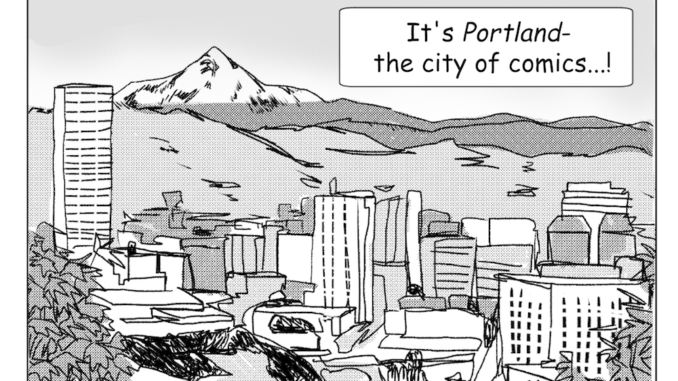
By Caitlin Chappell
If you come from a small town, you usually only have one comic book store in your county whose stock expands beyond superheroes. There is nothing wrong with those comics, but the medium is made up of so much more. There are underground artists telling innovative stories, graphic novels tackling historical events and comics standing up to atrocities seen in the contemporary world. Even if you are from a city with several comic book stores and conventions, the community is not always accessible. The comic book community in Portland is different.
Portland is home to over 15 comic book stores, Rose City Comic Con, several comic publishers, one of the few comic studies programs in the U.S. and a host of comic artists and writers. Fans of comics, including students at LC, have found this community to be more than welcoming.
“In general the people and community are super passionate,” Kaitlin Hall ’19 said. “They are people so passionate about being nerdy, and that’s amazing. We’ve come from a culture where being a nerd is not cool, and now that’s being switched.”
Portland’s comic book community is fueled by people who are passionate about the medium, fostering a welcoming environment that encourages them to pursue comics either as fans or creators.
“Portland is a big city for comics,” Michael Bowman, Director of Portland State University’s (PSU) Comic Studies Program, said. “At this point we have three major comic publishers headquartered here. It’s believed that there are more comic professionals living in Portland than any other city in the United States at this point.”
The three publishers Bowman mentioned are IDW, Image and Dark Horse. Dark Horse has been in Portland the longest, and has a rich history in creator owned comics, comics where the creators maintain the rights to their works. The owner and founder of Dark Horse, Mike Richardson, is known for his respect towards comic creators, assuring they maintain the rights to their work.
“He has been very creator-friendly since day one,” Davey Estrada, Editorial Director of Dark Horse, said. “(Creators) like Frank Miller came here because they knew they would maintain full ownership of their work.”
Companies like Dark Horse and Image stand out from other publishers because they produce creator-owned work. Creators have not always maintained the rights to their characters in the comic book industry. In the past, creators often signed contracts where they would not maintain the rights to their titles and characters, allowing the companies behind these contracts to thrive while the creators lost control over their work.
Dark Horse’s relationships with creators are strong because their creators maintain the rights to their works. Dark Horse also has strong relationships with its competitors, working together towards the same goal: to produce good stories.
“It’s pretty nice to have all these different publishers here,” Editor Daniel Chabon said. “I’m friendly with all of our competitors. I like the idea that we’re all working together in trying to put out the best books.”
Between the publishers, creators, fans and stores, Portland has an active community for comic books.
“That real sense of community makes the culture,” Katii O’Brien, an editor at Dark Horse, said. “It’s not just there happens to be a lot of us … You don’t have to go far to find someone who works in comics.”
This community spans a broad audience, from traditional superhero fans to political activists to underground artists — artists work outside of mainstream publishers. The creators, characters and stories seen in the Portland community are diverse, highlighting how comics are not made for one type of person.
“The Portland comic scene is proof that the audience is there for all kinds of comics,” Dave Marshall, Editor-in-Chief at Dark Horse, said. “You just have to make it accessible. You have to allow those people to make comics in the first place to speak to the experience of those communities.”
Portland is rich in resources for comic book creators and fans. The PSU Comic Studies Program gives students practical experience with writing comic books. Books with Pictures, a local comic store, holds workshops dedicated to teaching the community about comics. Missanthology, a nonprofit organization, offers female and LGBTQIA+ teens classes on comic publishing. They also publish an anthology of student work.
“The thing that makes me want to keep dedicating my life to comics is that they use the combination of text and images to communicate marginalized experiences,” Jenny Blenk, an Assistant Editor for Dark Horse and Editor for Missanthology, said. “I’m a queer woman with disabilities, and comics are the places where I’ve seen the most realistic depictions of what it’s like to live with those conditional identities.”
It is not just the creators who benefit from this community. Some fans say that they have a second home at their local comic book store or at one of the many comic conventions in Portland.
“The Portland convention scene in general is just a community and environment that is so inclusive, and I haven’t experienced that anywhere else,” Hall said.
Subscribe to the Mossy Log Newsletter
Stay up to date with the goings-on at Lewis & Clark! Get the top stories or your favorite section delivered to your inbox whenever we release a new issue.

Leave a Reply